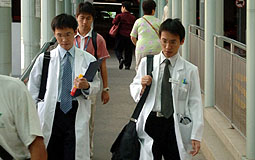 |
| Better care: An advisory committee will be formed by year's-end to study how to bolster primary healthcare. |
|
|
An advisory committee will be formed by year's end to study how to bolster primary healthcare, the Health, Welfare & Food Bureau says.
The bureau told lawmakers today questions involved in healthcare financing are complicated and more time is needed to explore the options thoroughly.
As the majority of the recommendations put forth in the Building A Healthy Tomorrow consultation paper have gained support from the public and healthcare professionals, the bureau will strengthen primary care in the direction set out in the consultation paper.
An advisory committee comprising healthcare professionals will be formed to see how to take forward the recommendations.
Chinese clinics open
Six public Chinese medicine clinics are in operation in Wan Chai, Central and Western, Tsuen Wan, Tai Po, Tseung Kwan O and Yuen Long. Three more in Tuen Mun, Kwai Tsing and Kwun Tong will open by year's-end, along with at least two more next year. Funding support will be sought from lawmakers in next year's second quarter.
Noting increasing public concern over improper use of medical devices, the bureau will expedite the migration from the existing administrative control system to a statutory registration system.
Stakeholders will be consulted in the coming year on the statutory regulatory framework while the Department of Health will conduct a regulatory impact assessment to identify and analyse the impact of different regulatory options. Lawmakers will be consulted in next year's second quarter.
Patient records go online
On the electronic patient record sharing pilot project launched in April, the bureau said so far 2,700 patients have consented to join, involving 500 private medical institutions and doctors. More patients will be recruited to partake in the pilot and the scheme will be reviewed in next year's third quarter.
In light of the requirements of the new International Health Regulations adopted by the World Health Organisation and to bolster Hong Kong's ability in tackling infectious-disease outbreaks, the Quarantine & Prevention of Disease Ordinance will be amended and details will be tabled to lawmakers in the coming months.
Meanwhile, an infrastructure is being formed to better integrate clinical and public health services on poisoning prevention. The proposed framework and new services, including strengthening the surveillance system, enhancing the capacity of public health and clinical diagnostic laboratory services, and providing quality clinical services for poisoned patients, will significantly improve the prevention, diagnosis and management of poisonings.
On tobacco control, lawmakers will resume reading of the Smoking (Public Health) (Amendment) Bill 2005 on October 18. If passed, most indoor public places and workplaces and some outdoor areas will be smoke-free from January 1. After the bill is enacted, the bureau will prepare subsidiary legislation for a fixed-penalty system. Lawmakers will be consulted on the proposal next year.
Cancer surveillance
To enhance the cancer surveillance regime, the Hospital Authority has embarked since September on clinical trials on nasopharyngeal cancer for the management of late-stage disease. A committee on liver disease will be formed to identify the best strategy for prevention, early detection and treatment before embarking on the clinical trial on liver cancer.
In the coming year, the bureau will explore how Hong Kong can build on its strengths in tertiary and specialised services, including the feasibility of setting up multi-partite medical centres with the participation of the public, private sectors and universities.
Improvements to the computer database for recording the wish of potential organ donors, currently covering about 40,000 people, will be completed by the end of next year to make it more easily accessible and able to safeguard proof of the donor's wish. The database will not replace organ-donation cards to enable those who prefer not to register their wish with a third party to keep their wish in a written form with themselves.
Go To Top
|



